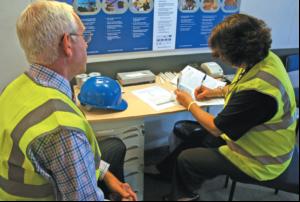Businesses must evolve drug and alcohol misuse policies
to continually ensure safe workplaces, says Iain Forcer
Reduced productivity and
absenteeism due to substance
misuse ie estimated to cost the UK
economy £1.5 biBusinesses must evolve drug and alcohol misuse policies
to continually ensure safe workplaces, says Iain Forcer
Reduced productivity and
absenteeism due to substance
misuse ie estimated to cost the UK
economy £1.5 billion. According to 13
years worth of test data collected by
Concateno, a European drug and alcohol
testing provider, alcohol and drugs
including cannabis and cocaine are a
common threat to the workplace.
Many companies now have robust
substance testing policies in force
designed to address the issue. But, with
strategies often neatly filed away, the rules
can be forgotten - or worse - ignored by
management and staff.
Simply writing a policy is not a quickfix
solution. Businesses must continually
refresh testing programmes to keep them
as up-to-date as possible, most
importantly as social attitudes towards
drugs, such as those which provide socalled
'legal-highs', change. Moreover,
managers must go one step further to
educate staff and provide a support
service for them, if needed.
Managers naturally want to avoid
situations which can cause accidents in
the workplace and it is part of the
employer's duty of care to the employee
to ensure a safe working environment.
But the danger with any drug and
alcohol workplace policy is that the details
and general principles can be ignored.
Existing employees may become
complacent, and think that they may get
away with excessive consumption 'just
this once'. Employees who may get caught
out in this way might argue that they have
not been reminded of the existence of the
policy for some years - which will not
play well in an employment tribunal.
The situation may also arise whereby
new managers are employed and perhaps
miss out on the necessary training on
drug / alcohol awareness and how to
apply the policy. Experienced managers
might also start to take the policy for
granted and think they can deal with
issues without testing. In some cases,
hard-pushed supervisors may learn to
work round the policy to avoid what they
perceive as 'unnecessary' testing that
interferes with their work schedule.
For all these reasons a regular and
thorough review of the policy is essential,
looking at the actions associated with the
policy, not just the words. Crucially, the
policy may also need to pick up on
loopholes that are being exploited.
Within the written policy there are
other changes that may need to be made.
Terminology that was once clear may
need amending to prevent ambiguity
which can be exploited by defence lawyers
in tribunals. 'Legal highs', for example,
put a new perspective on associating the
word legal with drugs - many policies use
'legal drugs' as a collective expression for
medication prescription. Developments in
testing methods mean that the initial
screening results may now be available at
the time of the test. This puts greater
emphasis on making sure the process is
called drug testing, not drug screening.
This is to avoid misinterpretation of the
phrase 'positive screen result'.
Many of the people involved in the
original policy development may have left
the company, taking their knowledge and
understanding of the principles underlying
the policy with them. Their successors may
look at the policy and make changes
through lack of understanding, resulting in
subtle changes of emphasis that can
become quite significant. This can make the
policy less effective in some areas, and overzealous
in others.
Shifting consumptions
Finally, the UK's consumption of drugs
and alcohol continually shifts. There is a
risk that the publicity given to the 'legal
highs', for example, will tempt people to
think these are reasonable and legitimate
ways to use drugs, or that the increased
availability of cocaine will be a
temptation. The internet provides vibrant
and sometimes entertaining, but not
always accurate, information about drugs
and drug testing. Employers need to
counter this by providing, from a reliable
source, the facts about drugs, alcohol and
the workplace and ensuring workplace
policies deal with these changing social
attitudes to all substances.
Employers also have the option to
introduce an Employee Assistance
Programme to further strengthen their
commitment to a robust testing
programme. Concateno for example
offers a confidential service which
combines online advice with seven day a
week, 24-hour phone assistance, offering
staff help on a range of issues such as
financial concerns, bereavement and
family problems which may all contribute
to drug and alcohol misuse. It aims to
answer questions immediately, or refer
enquirers to the most appropriate advisor,
counsellor or source of information.
This holistic approach demonstrates a
clear message to employees that substance
misuse is not only taken seriously but
employees can access support if they need
it. A thorough and continually evolving
strategy which is easily accessible is the only
effective way the workplace will be able to
tackle the issue of drug and alcohol misuse.
Iain Forcer is spokesperson for Concateno's
Employee Services.


